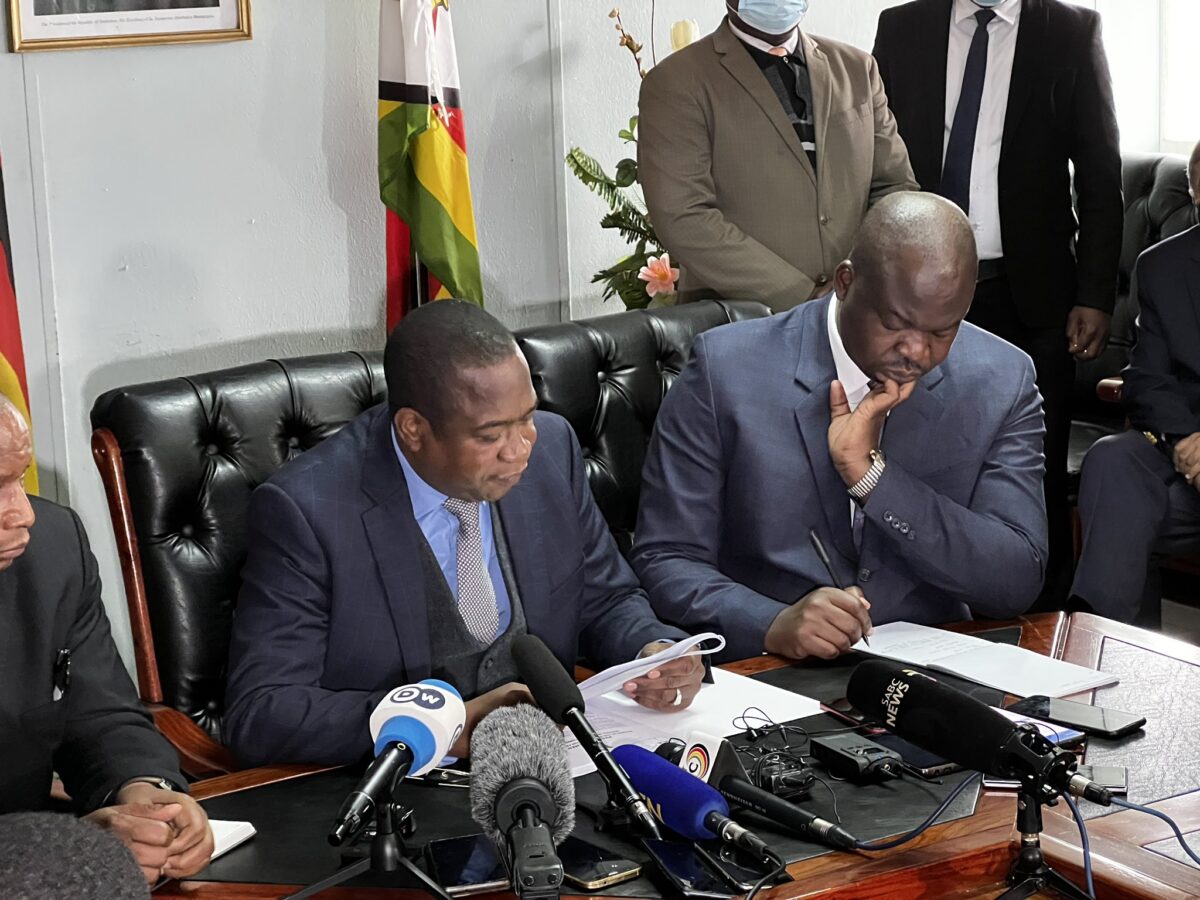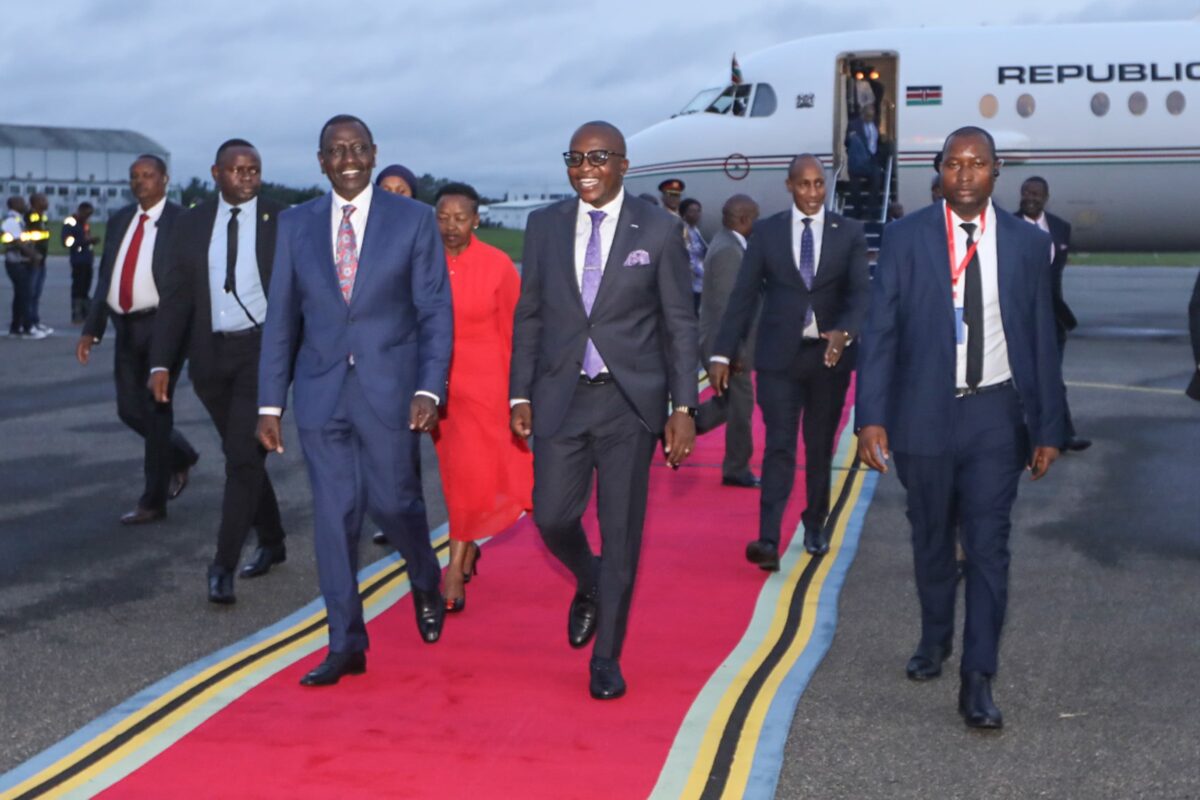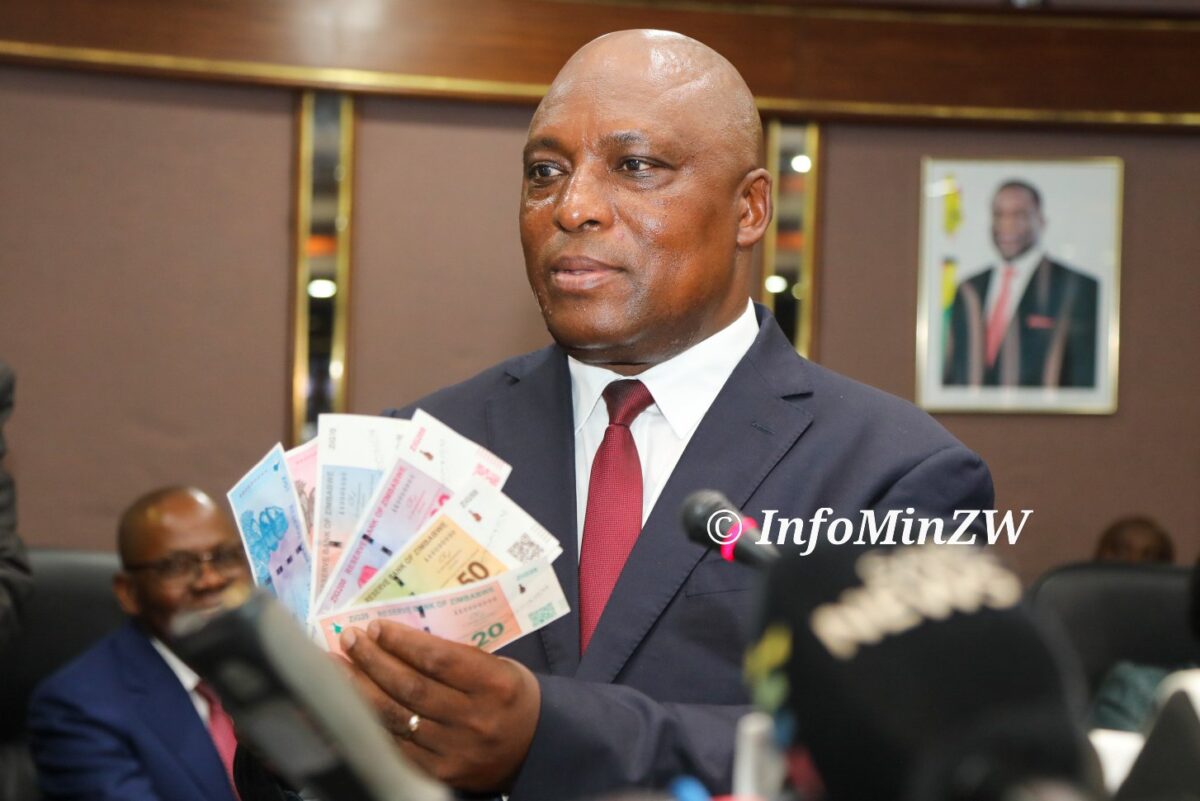Transcript of address by finance minister Mthuli Ncube at a news conference held on June 27, 2022, in Harare:
The government of Zimbabwe has recently taken significant steps to stabilise the exchange rate as announced through the presidential policy statement and other policy measures. The impact of these measures has signalled to the market the government’s total commitment to enhancing the country’s foreign exchange management systems.
However, additional measures to further strengthen these systems, based on the following well established economic facts relating to the country, are required:
The key drivers of exchange rate instability in any economy are fiscal deficits and the money creation by the monetary authorities. These two policy variables have for a long while now been brought fully under control.
In addition, the current account has moved from a deficit to surplus position. The trade balance has ceased to put pressure on the exchange rate.
The economy is generating substantial foreign exchange which is adequate to fund imports and other external payments.
The confidence deficit amongst economic agents as a result of past hyper inflation experiences has resulted in increased demand for US dollars as a store of value. This is reflected in the increasing holdings of foreign currency balances in the banking system. These balances however do not efficiently circulate in the economy due to structural issues in the banking sector.
The lack of confidence and high inflation expectations have incentivised economic agents to engage in parallel market bench-marking of prices; and a skewed preference for US dollars for commercial transactions, and forward exchange rate pricing, thus creating a vicious cycle of increasing prices which is self-fulfilling, and is generating higher month-to-month levels of inflation as well as fuelling adverse inflation expectations.
The proof of this lies in recent econometric studies done by the University of Zimbabwe, which indicate that inflation is not being caused by the normal real economic variables but by behavioural variables such as confidence, adverse inflation expectations, etc.
The skewed preference for US dollars in the economy has also resulted in a larger than normal demand for foreign exchange to support domestic transactions as opposed to foreign exchange being predominantly used to fund external transactions.
Based on the above economic facts, the government has put in place the following measures to build further confidence.
Entrenching the multi-currency system in law
The government has clearly stated its intention of maintaining a multi-currency system based on dual use of the US dollar and the Zimbabwe dollar. However, the market lacks confidence that the multi-currency system is here to stay for the foreseeable future. To eliminate speculation and arbitrage based on this issue, the government has decided to embed the multi-currency system and the continued use of the US dollar into law for the NDS1 period.
The interbank market exchange rate is now being determined by banks on a willing-buyer willing-seller basis. The utilisation in all economic transactions of this formal rate is now made mandatory by law. While economic agents are free to price their goods in US dollars or Zimbabwe dollars, and there are no price controls, the equivalence of US dollar prices and Zimbabwe dollar prices for a commodity should be strictly based on the current interbank exchange rate as determined by the willing-buyer willing-seller rate.
Measures to stabilise the price of fuel, maize meal and bread
Interventions in the fuel sector
Over the past few months following significant pressure on global fuel prices due to global geopolitical tensions, the government has been intervening in the fuel sector in order to stabilise fuel prices.
The actions have included the downward review of government fuel levies and the release of fuel from the strategic fuel reserve
This week, the government completely removed the levy on diesel i.e brought it to zero cents, and significantly dropped the levy on petrol to 4.7 USD cents per litre. This action prevented the price of fuel from breaching the US$2.00 per litre mark.
Interventions in the grain sector
The government is taking action to increase the supply of maize and wheat into the market in order to ensure availability and price stability. This is being done by releasing grain from the strategic grain reserve.
The following is, therefore, being proposed to provide interim relief to millers:
Wheat
The government is releasing 21,000 metric tonnes over the next one month to millers at the import parity price calculated at the prevailing interbank rate.
Millers have indicated that they will in turn import 70,000 metric tonnes of wheat over the same period. The wheat will be sold at an import parity price converted into local currency equivalent at the ruling exchange rate.
Maize
There is an immediate release of the 7,000 metric tonnes outstanding maize allocations to millers which had already been paid for but could not be allocated due to technical issues.
The government will also release an additional 25,000 metric tonnes of maize on a swap arrangement with millers.
Over and above this, millers have indicated that they have 25,000 metric tonnes of maize which has already been paid for and are ready to make a swap arrangement with the government. In this regard, the government will release the equivalent quantity of maize from the strategic reserve in July 2022 against the impending delivery of the purchased maize.
Thereafter, a further release of 27,000 metric tonnes of maize from the strategic grain reserve will be made to millers at a price of Z$75,000 plus the US$90 at the prevailing interbank rate.
Further Recommendations
It has been noted with concern that millers have always put the burden on the government to replenish their grain stocks. Whilst we appreciate the importance of ensuring food security to the nation, millers should be encouraged to source their own grain stocks whenever possible.
That said, the government will expedite the facilitation of maize from the region in order to ensure adequate local supplies.
The government of Zimbabwe remains committed to maintaining macro-economic stability and the elimination of harmful and destabilising arbitrage conditions that have pervaded the economy at the expense of the generality of citizens.
Remuneration for the government workforce
The government of Zimbabwe recognises and appreciates the tireless work and unwavering commitment to duty of all civil servants across the three arms of the state, namely the Executive (whole of government), the legislature (parliament), and the judiciary, including grant aided entities, agencies and independent commissions.
To this end, the government has been closely monitoring developments in the macro economy, with a view of ensuring that exogenous shocks from adverse macro-economic developments do not seriously erode the purchasing power of civil servants’ salaries.
As such, the government has been reviewing the cash and non-cash benefits of civil servants as follows:
The Executive
Just recently, the government announced that civil servants’ basic salaries have been increased by 100 percent with effect from July 1, 2022, and that negotiations are continuing through the National Joint Negotiating Committee (NJNC) platform to come up with additional salary for and condition of service reviews.
In addition, serving members of the civil service have the following benefits: –
A housing loan guarantee scheme; civil service housing loan scheme; and access to the duty-free importation of a single motor vehicle for personal use by the civil servant.
Health Sector
With particular regard to the health services sector, the government has reviewed upwards the health sector specific allowances in the following areas: –
-On-call allowances, which apply to doctors and laboratory scientists;
-Night-duty, stand-by/callout allowances, which apply to nurses, nurse aides and general hands in theatre;
-Nurse managers allowances;
-Special health equalisation factor which applies to all eligible staff;
-Covid and infectious disease risk allowances.
In addition, the government has reviewed the non-monetary benefits for the health sector including the following: –
-Provision of institutional housing for health workers starting with Harare and Bulawayo;
-Provision of housing loan guarantees;
-Provision of efficient transport facilities, starting with referral/central hospitals
-Addressing deficiencies in the cafeteria system and re-operationalising the system; and
-Local production and sourcing of uniforms for health personnel.
Teachers
-Restoration of advancement awards;
-Payment of performance awards which had been withheld due to financial constraints have been restored and these will now be processed effective July 1, 2022. For this purpose, members will now be placed on their correct employment grades;
-Payment of school fees for up to 3 biological children per teaching family;
This benefit applies to teachers and payment will be made directly to schools and will be up to a prescribed limit per biological child. Currently this limit is Z$20,000 per child per term and treasury is ready to disburse the required amounts for the first term.
-Provision of 34,000 housing units as institutional accommodation for teachers
To cushion teachers from the rising cost of accommodation, the government has committed itself to provide 34,000 housing units within and outside school premises over a period of five years.
-Provision of transport facilities to ferry teachers in both rural and urban areas has already commenced. This is facilitated by existing structures under the civil service bus fund and rural and urban mass transport system.
Security Sector
The government values the critical role played by the security services in the economy. Substantial progress has been made in ensuring competitive remuneration and general improvement of the conditions of service for members in the security sector.
The government has introduced military salary concept and its equivalent, across the security cluster, covering various categories of benefits.
In addition, the government has accelerated the acquisition of operational vehicles for middle management.
The government is also instituting immediate measures to increase access to institutional housing and transportation for serving members of the security services.
The security services sector also has access to the housing loan guarantee scheme to enable members to purchase houses in the areas of their choice, under the frameworks being finalised by the service commissions and the respective participating financial institutions.
Housing loan guarantee scheme for home ownership by civil servants
The Public Service Commission in collaboration with the Ministry of National Housing and Social Amenities, Ministry of Local Government and Public Works and Treasury are working towards the resuscitation of the housing loan guarantee facility for civil servants under which the government will be the guarantor of housing mortgages applied for by members through the identified network banks. Consultations between relevant stakeholders have already been initiated by the Public Service Commission.
Payment of a US$75 Covid-19 allowance
Recognising the significant risk factors faced by Civil Servants who are mostly frontline workers, the government introduced an US$75 per month Covid-19 risk allowance. This amount is still payable in foreign currency and will continue to be paid for the foreseeable future.
Payment of a US$100 per month cushioning allowance
Recognising the hardships faced by public sector workers in the face of adverse macro-economic developments and the impact of dual currency pricing, the government introduced a US$100 per month cushioning allowance payable in foreign currency. This allowance also continues to be paid and will subsist for the foreseeable future.
The Legislature (Parliament of Zimbabwe)
Parliamentarians and staff of the parliament of Zimbabwe have also had various reviews implemented across both salary and non-cash benefits as follows:-
-Salaries have been increased by at least 100 percent with effect from July 1, 2022
-Sitting allowances have been similarly increased.
-The government has also introduced a contributory medical scheme where the government will contribute 80 percent to the subscriptions, similar to the scheme which is in place for civil servants.
-The government has introduced a duty-free importation of a second motor vehicle for use by parliamentarians in their public service work.
-In order to ease transport challenges for employees, the government acquired buses for use by parliament staff.
Constituency Visit Allowance
In the spirit of “Leaving No-One and No Place Behind” in public engagement, the government has recently introduced a constituency visit allowance to improve close relations between elected officials and their constituents and electorate. Fuel is provided to members in all constituencies irrespective of the distance to their constituencies from the capital city.
Members of the legislature are also being paid the combined US$175 per month allowance comprised of the US$75 Covid-19 Allowance and the US$100 cushioning allowance.
The Judiciary
All members of the judiciary have received a salary increase of a minimum of 100 percent with effect from July 1, 2022. In addition, an allowance that recognises and aligns remuneration with peers in the legal profession has also been put in place.
Members of the judiciary are now also benefitting from the housing loan guarantee scheme and the housing loan scheme as well as the duty-free facility for the importation of one motor vehicle.
Members of the judiciary are also being paid the combined US$175 per month allowance comprised of the US$75 Covid-19 allowance and the US$100 cushioning allowance.
In conclusion, therefore, the government of Zimbabwe reiterates its commitment to pay competitive remuneration to civil servants in order to retain critical skills and derive efficient public services.
Accordingly, the government will continue to analyse conditions of service for all civil servants in order to appropriately and timeously benchmark these in line with economic developments.















